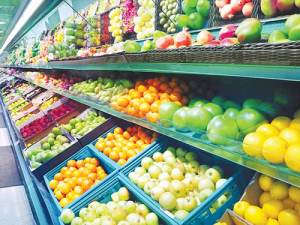Fonterra’s exit from Australia ‘a major event’
Fonterra’s impending exit from the Australian dairy industry is a major event but the story doesn’t change too much for farmers.
 NZ households are spending significantly more on food amid continually changing purchasing and consumption behaviours.
NZ households are spending significantly more on food amid continually changing purchasing and consumption behaviours.
Latest research by agri banking specialist Rabobank and food rescue charity KiwiHarvest says NZ households are spending significantly more on food amid continually changing purchasing and consumption behaviours.
The first Food Waste Survey was conducted in April 2021, with the recent survey – carried out by independent research agency KANTAR – involving interviews with 1500 New Zealanders in July and August this year.
The study found the average New Zealand household is now spending $238 per week on food, 9% more than they were in 2022.
Despite rising prices, most New Zealanders’ grocery shopping behaviours were largely in line with a year ago, with 72% favouring doing a main grocery shop and then ‘top-up’ shopping as necessary, with 19% only doing a main shop and no top up shopping.
The remaining 10% say they only grocery shop as they need things.
However, the survey did uncover a few minor changes in shopping behaviours likely motivated by a desire to keep the weekly food bill down.
There was also a sizeable fall in the numbers of New Zealanders identifying as vegan (3% from 5%) and the number of Kiwis planning on reducing meat consumption.
“Across recent surveys, we’ve seen around 30% of respondents saying they are planning to reduce meat consumption, citing a range of reasons for doing so – including perceived health benefits, cost of meat and a desire to reduce the impact on the environment,” says Rabobank head of sustainable business development Blake Holgate.
“However, the survey data does suggest attitudes towards meat may be changing.
“Only 25% of New Zealanders are now saying they are planning to reduce meat consumption, while at the other end of the spectrum, 9% of Kiwis now say they plan to eat more meat (up from 7%).”
Having first started tracking food service app usage in 2019, the survey also found food app usage appears to have stabilised following several years of strong growth.
HelloFresh, in particular, recorded exceptionally strong growth since its entrance to the New Zealand market in 2018 (32% of New Zealanders had used the service in the last 12 months compared to 6% in the 2019 survey).
However, the 2023 survey found usage of the major food service apps had plateaued with usage stable across the three largest providers, while among emerging food service apps usage was also relatively unchanged.
The Meat Industry Association of New Zealand (MIA) today announced that Chief Executive Officer Sirma Karapeeva has resigned from the role.
The winners of the 2026 Hawke’s Bay/Wairarapa Dairy Industry Awards were announced at the annual awards dinner held at Copthorne Solway Park in Masterton on Thursday evening.
Environment Southland is welcoming this week’s decision by the Environmental Protection Authority (EPA) to approve the release of Blaptea elguetai, a leaf‑feeding beetle that will help control the highly invasive Chilean flame creeper.
This March, the potato industry is proudly celebrating International Women’s Day on 8 March alongside the International Year of the Woman Farmer, recognising the vital role women play across every part of the sector — from paddocks and packhouses to research, leadership, and innovation.
Fruit trader Seeka posted a record profit and returns to shareholders in 2025.
Recent weather events in the Bay of Plenty, Gisborne/Tairawhiti, and Canterbury have been declared a medium-scale adverse event.

OPINION: A mate of yours truly reckons rural Manawatu families are the latest to suffer under what he calls the…
OPINION: If old Winston Peters thinks building trade relations with new nations, such as India, isn't a necessary investment in…